Challenging Behaviour Training
Quantity: 1

Duration 3 hours
Last audited 30th June 2025


100% online training
Start when you like
Learn on any device (desktop, mobile or tablet)
Instant assessment and result
1 learner per course
Train teams of all sizes
Bulk discounts starting at 10% off 10 courses
Pay by invoice with 30 day payment terms available (5+ courses)
Includes a 10% discount for 10+ courses
As someone who works with children, it's likely that you have encountered challenging behaviour at some point in your career. It can be difficult to know how to deal with this sort of behaviour - research by the Department for Education has shown that it is a major reason for teachers leaving the profession. However, with the right knowledge and techniques - and the understanding that there is usually an underlying cause that needs to be identified and supported - you can handle challenging behaviour effectively, appropriately, and confidently.
This Challenging Behaviour training course provides learners with the knowledge they need to respond to challenging behaviour in children of all ages. It goes into detail about the underlying causes and functions of the behaviour, the proactive strategies you can use to reduce the likelihood of it occurring, and how to deflect or react to low-level behaviour. The course will also discuss extreme challenging behaviour, including how to de-escalate incidents and put support in place (such as behaviour support plans, restorative practice, and targeted interventions) to help the child after the event.
This course has been developed to utilise animation, instructional video, and user activities to maximise engagement and learning.
100% online training
Access anywhere
Same day digital certificate
Printed certificate posted next working day
Full audio voiceover
Assessment retakes at no extra cost
Developed by education and behaviour specialists
Accredited by CPD
Featuring a range of downloadable and interactive resources
Earn 3 CPD points on completion
Bulk discount for orders of 10+ courses
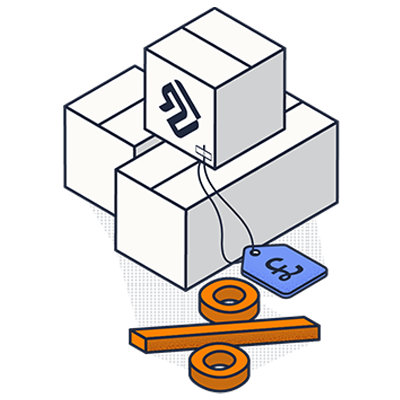
Save on our courses when you buy more training upfront. Lock in a better price now and access the training whenever you need to. You can mix and match any of our courses too and get the discount off your whole order.
10+ courses = 10% off
50+ courses = 20% off
100+ courses = 30% off
500+ courses = 40% off
By the end of this course, you will:

Accredited by CPD
All of our courses are accredited by the CPD Certification Service as conforming to universally accepted Continuing Professional Development (CPD) guidelines.
Our in-house Learning Designers develop all of our courses to give you and your learners the most engaging training possible.
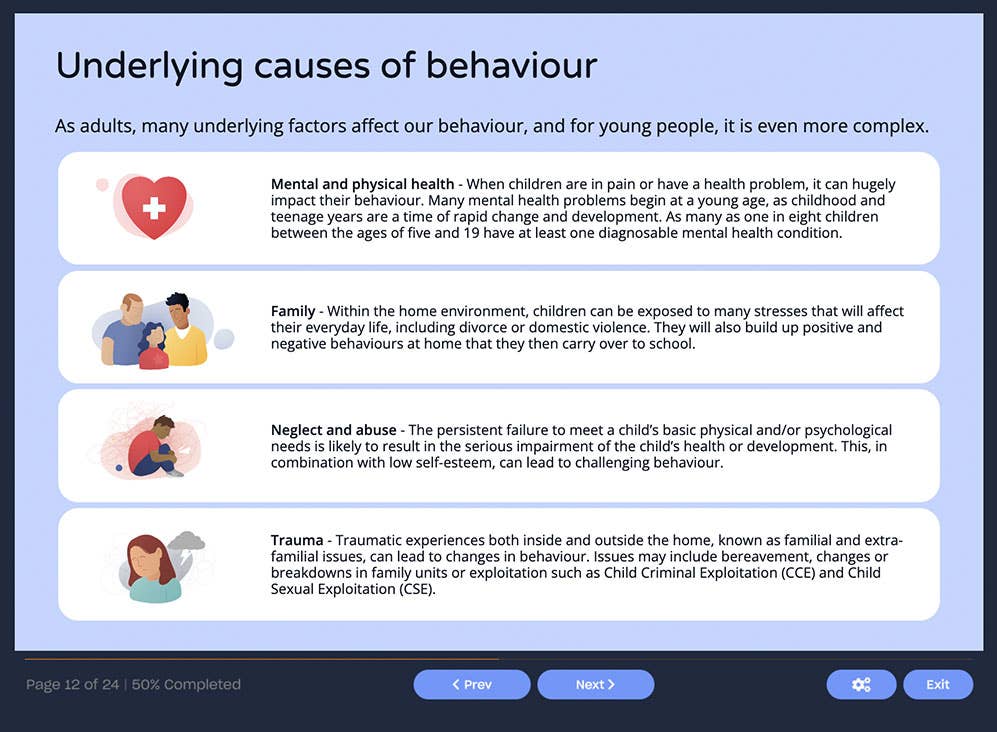
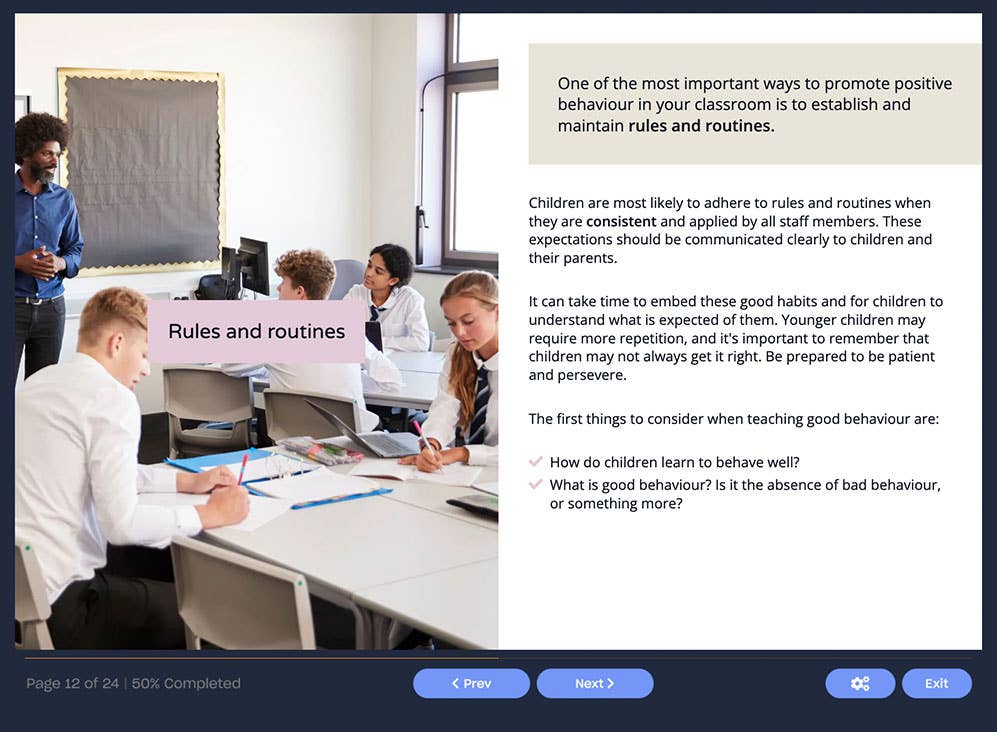
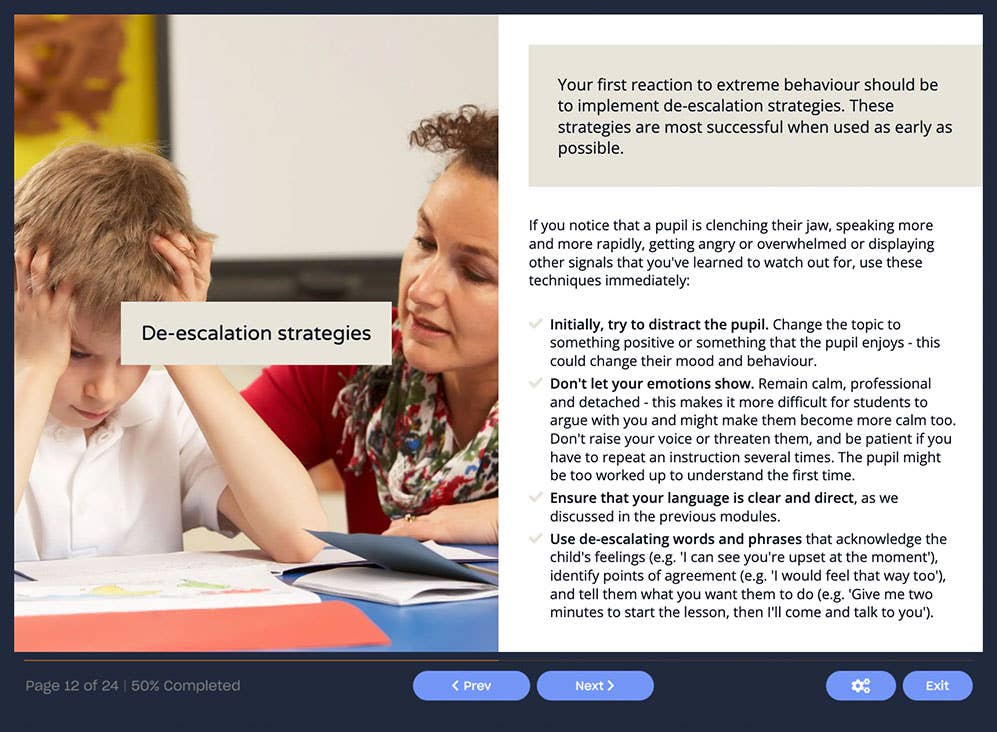
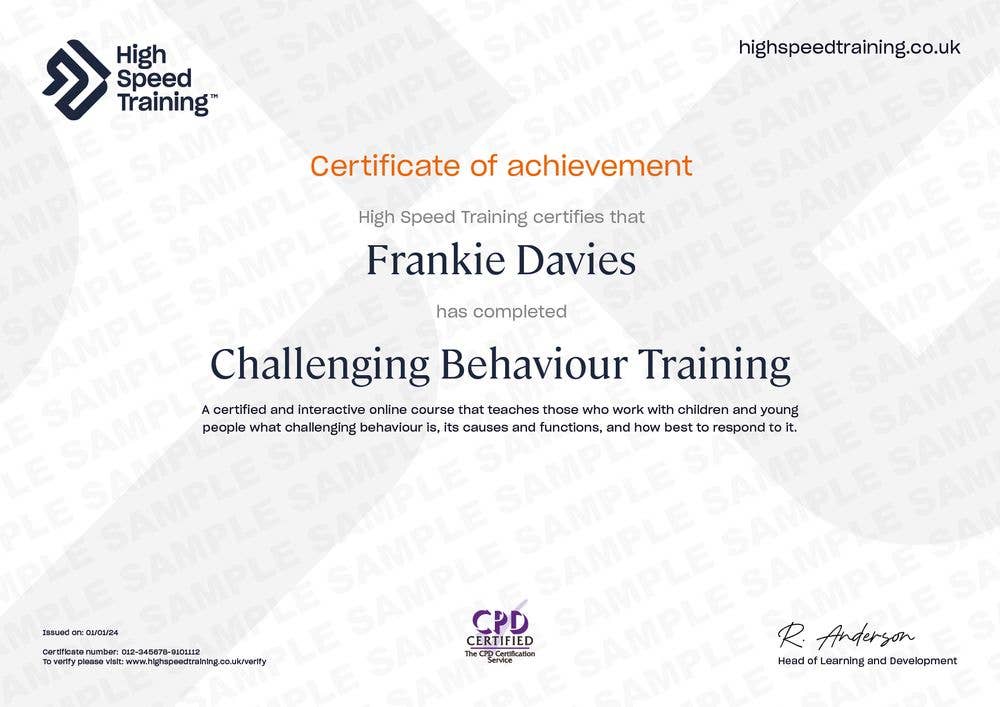




What is challenging behaviour, the impact of challenging behaviour, functions of behaviour, underlying causes of behaviour, understanding and explaining behaviour, the whole-school approach.
Modelling positive behaviour, building relationships, language, voice, and vocabulary, giving clear instructions, gaining pupils' attention, rules and routines, visual prompts, expectations, consistency, preparation, culture and challenging behaviour, rewards and recognition, the learning environment, engaging with parents and carers.
What is low-level disruption, strategic ignoring, redirection, peer praise, correction, set responses, restorative practice, sanctions and consequences.
What is serious or extreme behaviour, de-escalation strategies, physical intervention, sanctions and consequences, resolving behaviour incidents, monitoring or documenting behaviour, behaviour support plans, interventions.
Supporting yourself and others, self-care, research-based behaviour tips, behaviour audit survey, top tips infographic, challenging behaviour podcast, further reading, behaviour model, downloadable course summary.
The online assessment is taken on completion of the training material. You will be asked 20 multiple choice questions with a pass mark of 80%. The answers are marked automatically so you will instantly know whether you have passed. If you don't pass don't worry! You can take the test as many times as you need with no extra charge.
This online course is recommended for professionals who want to have a better understanding of how to respond to the behaviour of the children and young people that they work with. The course has a focus on educational settings, meaning it is most suitable for school staff, such as teachers and teaching assistants.
This course was created for all ages of children and young people, though some techniques may need to be adjusted to suit your setting and age range.
If you have not taken any training in child protection before, then it's recommended that you also take our Introduction to Safeguarding Children course.

In partnership with
Ian Curry
Education Consultant
Ian Curry is an education professional with extensive senior leadership experience, holding a PGCE and a BA (Hons) in Leisure and Business. In his role as a Deputy Headteacher, his key responsibilities included the pastoral care of students, behaviour and attendance management, and serving as the Designated Safeguarding Lead (DSL) and Designated Mental Health Lead.
He has also worked with the Department for Education (DfE) on 'Prevent' Duty training and was commissioned as a Specialist Leader of Education (SLE) to provide outreach work on behaviour management and restorative practice. Ian specialises in school improvement and leadership, safeguarding and child protection, behaviour management and restorative practices, staff development and coaching, strategic planning and implementation, and stakeholder engagement.